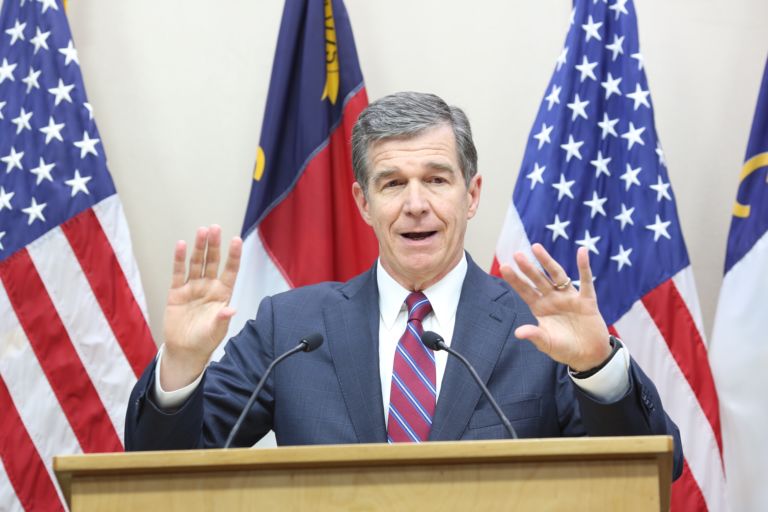In a desperate attempt to head off the expected expansion of the Opportunity Scholarship Program, anti-choice advocates are taking to social media. One of the most circulated posts is from a Facebook page called “Tales of an Educated Debutante,” which also seems to have been circulated to legislators at the General Assembly. Given the wide circulation of the post, I’d like to respond to several of the post’s major points.
Claim: “For the last ten years, North Carolina has had a voucher program. Last year, the Senate voted to expand the program for all families, especially the rich ones.”
Response: Last year the North Carolina House and Senate voted to expand the Opportunity Scholarship Program as part of the state budget bill. The bill, spearheaded by the Republican majority, was supported by five Democrats in the House. Gov. Cooper let the 2023 budget bill become law without his signature.
Claim: “Say goodbye to your tax dollars. Our state will go from spending $133 million to half a billion in the next ten years.”
Response: The implication is that the Opportunity Scholarship Program is robbing the public schools of precious dollars. A little perspective is in order.
In 2014, the first year of the Opportunity Scholarship Program, the average per-pupil expenditure in North Carolina was $8,477. In 2022 (the latest year for which data is available), the same figure was $12,345. If you include only state per-pupil support, those numbers are $5,390 and $7,425 for 2014 and 2022, respectively.
The amount spent on Opportunity Scholarship awards is a drop in the bucket compared to the amount spent overall on the public-school system. In 2021-22, state spending on traditional K-12 public schools (not including federal or local dollars) was $10,082,057,788. The amount available for Opportunity Scholarship awards that same year was $74,840,000. That’s 0.7% of the amount the state spent on public schools.
Advocates say the Opportunity Scholarship Program is taking dollars from the public schools. Remember, last year’s budget included a provision requiring the North Carolina State Education Assistance Authority to report annually to the General Assembly on the financial impact of the Opportunity Scholarship Program on local public schools. The legislation also included language declaring the General Assembly’s intention “to reinvest in the public schools any savings realized by the State” when a student accepts an Opportunity Scholarship award that is less than 100 percent of the average state per-pupil allocation.
Claim: “Vouchers are not actually about school choice. NC private schools- to be funded by your tax dollars- can turn down anyone they choose whether they have Down syndrome or are gay. That’s right- your Senate has decided that our state should spend a half billion to fund segregation.”
Response: Anti-voucher advocates imply that school choice is not about giving parents options but about discrimination. Nothing could be further from the truth. Furthermore, the claim that school choice encourages racial segregation is false. If that’s the case, why do such high percentages of minorities support school choice?
In a 2020 article by Matthew Chingos and Tomas Monarrez, the authors explore compelling reasons why we should question the view that choice fosters segregation. The authors call for a more nuanced methodology to measure segregation. School attendance boundaries in most places already segregate students. Choice options for parents in these areas may actually work against the many forces that tend toward segregating students. Opponents of school choice too quickly dismiss the view that school choice can be a force for breaking down socioeconomic barriers that have prevented many students from accessing the schools that work best for them.
Those who oppose school choice say it’s not actually about choice but about discrimination. They also imply that private schools discriminate, unlike public schools.
It’s important to note that private schools must comply with the same health, safety, and nondiscrimination statutes that public schools must meet.
Choice opponents say public schools are free and open to all. That’s not necessarily the case. Public schools discriminate against those who are not zoned to attend a particular school. Students may be admitted to some public schools only if they live in a certain area. Other public schools, such as magnet or charter schools, may also turn away students who do not meet the admissions criteria.
Choice opponents say that school choice unjustly discriminates against LGBT students. Title IX prohibits discrimination on the basis of sex and applies to private schools that receive federal funds. However, private schools run by religious organizations are exempt “to the extent that application of Title IX would be inconsistent with the religious tenets of the organization.” Knowing the school’s beliefs, one wonders why students who hold contrary views would logically seek to be a part of such institutions.
Claim: “The voucher program is a tax break for the rich. Currently, over 100,000 North Carolinians send their kids to private schools without a voucher. This year, we will begin sending them checks. People with beach houses and private jets who live a life of opulence. For them, that $3300 check- paid for out of your hard-earned tax dollars- is equivalent to a night at the Ritz Carlton and maybe a nice bottle of champagne.”
The implication here is that there is an injustice in extending eligibility for the Opportunity Scholarship Program to higher-income households. If you look at taxes paid, that’s a difficult argument to make. Individuals who make over $100,000 annually account for less than a quarter (23.4 percent) of all taxpayers but provide almost three-quarters (74.3 percent) of all tax revenue. The argument against providing a small voucher is far from compelling when you consider the full picture.
It’s a mistake to assume that all families who send their children to private schools are those “with beach houses and private jets who live a life of opulence.” There are different types of private schools. Catholic schools generally seem to be the least expensive, followed by Christian schools, which can be more expensive, and then elite private schools whose tuition can be $25,000 per year or more. In 2022-23, the average household income of Opportunity Scholarship recipients was $44,299. That’s hardly enough to buy beach houses and private jets. While the General Assembly made all North Carolina students eligible for a scholarship, limited funding and the fact that lower-income households are prioritized make it unlikely that the program will attract high-income households this year.
Despite what critics say, the Opportunity Scholarship is a proven program with strong support. National and state polls continually indicate that parents believe they should be able to control how and where their children are educated. Yet current policy, which assigns students to their local public schools, contradicts such sentiments.
A January 2024 Carolina Journal Poll found that 48 percent of respondents were dissatisfied “with the quality of the K-12 education students receive today in [their] local schools.” In that same poll, 77 percent of respondents said that parents are “best suited to determine where a child should attend school.”
The Opportunity Scholarship Program has grown dramatically in ten years. That growth derives from parents wanting the opportunity to choose the educational option that best fits their child’s needs.
We commend the General Assembly for making all North Carolina students eligible for the Opportunity Scholarship Program. North Carolina supports strong public and private schools. The type of school a child attends — whether it be public or private — is a choice parents can best make. And it’s a choice we all celebrate.


